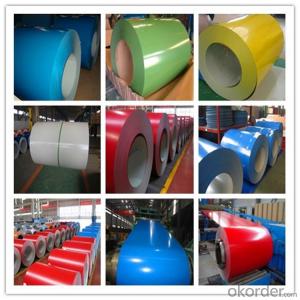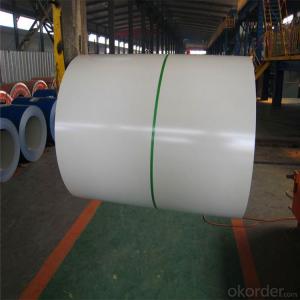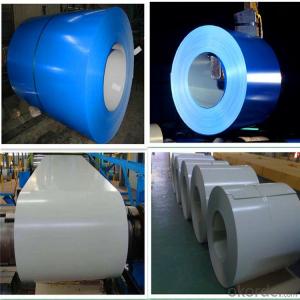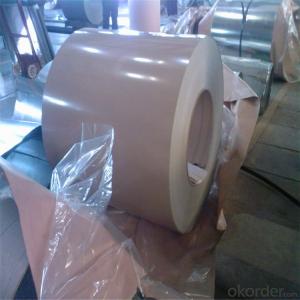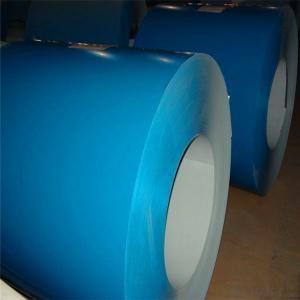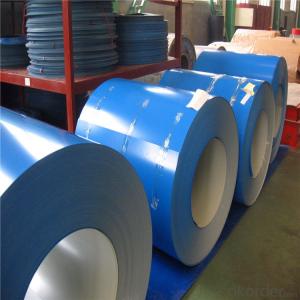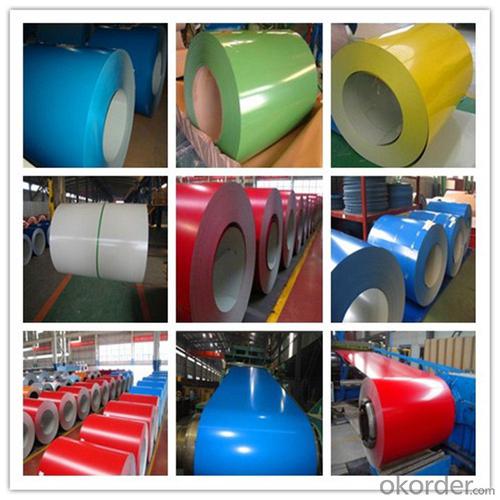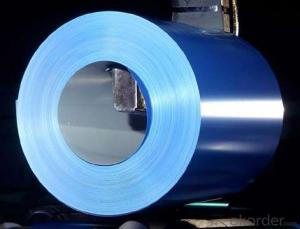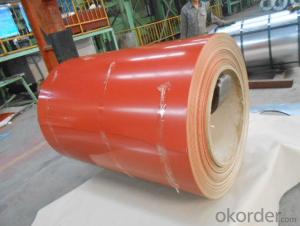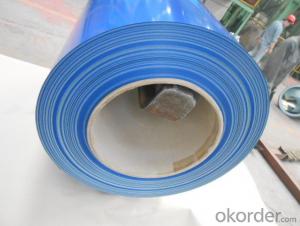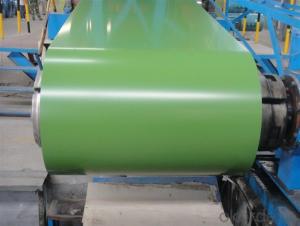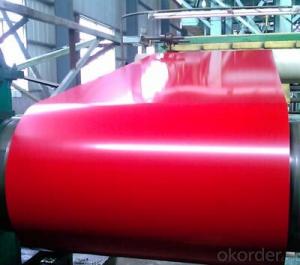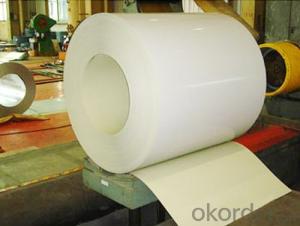China Supplier Color Coated Galvanized Steel Coil Prime PPGI
- Loading Port:
- Shanghai
- Payment Terms:
- TT OR LC
- Min Order Qty:
- 100 m.t.
- Supply Capability:
- 50000 m.t./month
OKorder Service Pledge
OKorder Financial Service
You Might Also Like
Specification
China Supplier Color Coated Galvanized Steel Coil Prime PPGI
Description of China Supplier Color Coated Galvanized Steel Coil Prime PPGI
Product | PPGI/PPGL |
Capacity | 5,000 tons/month |
Base material | Hot dipped galvanized steel |
Thickness | 0.2-2.0mm |
Width | 600-1250mm(according to your need) |
Coil Weight | 3-6tons |
Quality | SGCC, DX51D |
Color | RAL No. or customers samples’ color |
Zinc-coating | 30g/m2-180g/m2 |
Coil ID | 508mm/610mm |
Technique | Cold rolled—hot dipped galvanized—color coated |
Painting | Top painting:15~25μm |
Back painting: 6~10μm | |
Tolerance | Thickness: +/-0.02mm |
Width:+/-2mm | |
Shipment time | within 15-45 workdays |
Payment | T/T, L/C at sight |
Packing | Standard export packing |
The special order can be negotiated. | |
Application of China Supplier Color Coated Galvanized Steel Coil Prime PPGI
APPLICATION OF OUR PREPAINTED STEEL | ||||||||||
Construction | Outside | Workshop,agricultural warehouse,residential precast unit | ||||||||
corrugated roof,roller shutter door,rainwater drainage pipe,retailer booth | ||||||||||
Inside | Door,doorcase,light steel roof stucture,folding screen,elevator,stairway,ven gutter,Construction Wall | |||||||||
Electrical applicance | Refrigerator,washer,switch cabnet,instrument cabinet,air conditioning,micro-wave owen,bread maker | |||||||||
Fuiniture | Central heating slice,lampshade,chifforobe,desk,bed,locker,bookself | |||||||||
Carrying trade | Exterior decoration of auto and train,clapboard,container,isolation lairage,isolation board | |||||||||
Qthers | Writing panel,garbagecan,billboard,timekeeper,typewriter,instrument panel,weight sensor,photographic equipment | |||||||||
Products Show of China Supplier Color Coated Galvanized Steel Coil Prime PPGI

Product Advantages
1.With nearly 20 years experience in prepainted steel, accommodate different marketdemands. | ||||||||||||||
2.'Quality first, service first' is our business aim; 'The good faith get respect,cast quality market' is our Business philosophy . | ||||||||||||||
3.Having two series producttion line,with the abbual production capacity of 240000 tons. | ||||||||||||||
4.Exceed International ISO9001:2008&ISO14001:2004 quality and environmental standards | ||||||||||||||
5.Meet with ROHS standard |
Company Information
CNBM International Corporation is the most important trading platform of CNBM group.
Whith its advantages, CNBM International are mainly concentrate on Cement, Glass, Iron and Steel, Ceramics industries and devotes herself for supplying high qulity series of refractories as well as technical consultancies and logistics solutions.


F A Q
1, Your advantages?
professional products inquiry, products knowledge train (for agents), smooth goods delivery, excellent customer solution proposale
2, Test & Certificate?
SGS test is available, customer inspection before shipping is welcome, third party inspection is no problem
3, Factory or Trading Company?
CNBM is a trading company but we have so many protocol factories and CNBM works as a trading department of these factories. Also CNBM is the holding company of many factories.
4, Payment Terms?
30% TT as deposit and 70% before delivery.
Irrevocable L/C at sight.
5, Trading Terms?
EXW, FOB, CIF, FFR, CNF
6, After-sale Service?
CNBM provides the services and support you need for every step of our cooperation. We're the business partner you can trust.
For any problem, please kindly contact us at any your convenient time.
We'll reply you in our first priority within 24 hours.
- Q: How does special steel perform in oil and gas applications?
- Special steel performs exceptionally well in oil and gas applications due to its excellent corrosion resistance, high strength, and temperature resistance. It is specifically designed to withstand harsh environments, including exposure to corrosive chemicals, high pressure, and extreme temperatures. This makes it an ideal material for manufacturing pipelines, valves, drill bits, and other critical components used in the oil and gas industry. Additionally, special steel's superior mechanical properties ensure durability, reliability, and longevity, thereby reducing maintenance costs and improving overall operational efficiency.
- Q: How does special steel perform in terms of impact resistance?
- Special steel typically performs very well in terms of impact resistance. Due to its unique composition and manufacturing process, it is able to withstand high amounts of force and pressure without fracturing or breaking. This makes it highly suitable for applications where impact or shock loads are common, such as in construction, automotive, and aerospace industries.
- Q: How does special steel contribute to the construction sector?
- Special steel contributes to the construction sector by providing enhanced strength, durability, and corrosion resistance to various structural components. Its unique properties enable the construction of high-rise buildings, bridges, and infrastructure projects that can withstand extreme conditions and last for decades. Additionally, special steel offers flexibility in design, allowing for innovative and efficient construction techniques.
- Q: What are the magnetic properties of special steel?
- Special steel can exhibit a range of magnetic properties, depending on its composition and treatment. Some special steels, such as austenitic stainless steel, are non-magnetic due to their high nickel content. On the other hand, certain types of special steel, like ferritic or martensitic stainless steel, can be magnetic. Additionally, some special steels can be made magnetic through processes like heat treatment or cold working. Therefore, the magnetic properties of special steel can vary and are influenced by several factors.
- Q: Can special steel be used in electrical applications?
- Yes, special steel can be used in electrical applications. Special steel, such as electrical steel or transformer steel, is specifically designed to have low electrical resistance and high magnetic permeability, making it ideal for use in electrical equipment like transformers, motors, and generators.
- Q: What are the main characteristics of corrosion-resistant castings?
- Corrosion-resistant castings are designed to withstand the damaging effects of corrosion, a natural process that deteriorates the surface of metals due to chemical reactions. These castings possess several main characteristics that make them resistant to corrosion. Firstly, corrosion-resistant castings are made from specific alloys or materials that are inherently resistant to corrosion. These materials may include stainless steel, nickel-based alloys, or high-performance alloys like Inconel or Hastelloy. These alloys contain elements such as chromium, molybdenum, or nickel that form a protective layer on the surface of the casting, preventing the corrosive agents from reaching the underlying metal. Secondly, these castings are produced using meticulous casting techniques that ensure a dense and defect-free structure. This is vital in preventing the penetration of corrosive substances into the casting. Techniques such as investment casting or vacuum casting are commonly employed to achieve a high level of precision and quality. Another important characteristic of corrosion-resistant castings is their ability to resist various types of corrosion, including general corrosion, pitting corrosion, crevice corrosion, and stress corrosion cracking. General corrosion refers to the gradual, uniform deterioration of the metal surface, while pitting corrosion creates localized holes or pits. Crevice corrosion occurs in confined spaces, such as gaps or joints, and stress corrosion cracking results from the combined effects of stress and a corrosive environment. Corrosion-resistant castings are designed to withstand all these corrosion types, ensuring long-term durability and reliability. Furthermore, corrosion-resistant castings often undergo additional surface treatments or coatings to enhance their resistance to corrosion. These treatments may include passivation, where the surface is chemically treated to form a protective oxide layer, or the application of protective coatings such as epoxy or polyurethane. These treatments provide an extra layer of defense against corrosive agents, extending the lifespan of the casting. In summary, the main characteristics of corrosion-resistant castings are the use of corrosion-resistant alloys, meticulous casting techniques, resistance to various types of corrosion, and the application of surface treatments or coatings. These characteristics ensure that these castings can withstand harsh environments and maintain their structural integrity over time, making them ideal for applications where corrosion is a significant concern.
- Q: What are the requirements for special steel used in corrosive environments?
- Special steels used in corrosive environments are required to have specific properties to ensure their durability and performance in such conditions. The requirements for these steels can be summarized as follows: 1. Corrosion resistance: The primary requirement for special steels used in corrosive environments is excellent corrosion resistance. These steels should be able to withstand the attack of aggressive substances such as acids, alkalis, and salts. They should exhibit minimal or no signs of corrosion, ensuring the longevity of the steel and preventing any degradation in performance. 2. High strength: Special steels used in corrosive environments should possess high strength to handle the mechanical stresses imposed on them. This property is crucial for applications where the steel is subjected to heavy loads, pressures, or impacts. High strength also helps in maintaining the integrity and structural stability of the steel in corrosive conditions. 3. Resistance to pitting and crevice corrosion: Pitting and crevice corrosion are localized forms of corrosion that can occur in the presence of certain aggressive chemicals or stagnant environments. Special steels should have resistance to such forms of corrosion, as they can lead to localized damage, reduced structural integrity, and potential failure of the steel. 4. Stress corrosion cracking resistance: Stress corrosion cracking is a phenomenon that occurs when a combination of tensile stress and a corrosive environment compromises the material's integrity. Special steels should be resistant to stress corrosion cracking, ensuring their reliability under applied loads in corrosive environments. 5. Resistance to intergranular corrosion: Intergranular corrosion can occur along grain boundaries, leading to the weakening of the material. Special steels used in corrosive environments should have good resistance to intergranular corrosion, preventing any loss in structural integrity. 6. Thermal stability: Special steels should exhibit thermal stability to maintain their properties and resist degradation at elevated temperatures. This characteristic is essential for applications involving high-temperature corrosive environments. 7. Easy maintenance: Special steels used in corrosive environments should be relatively easy to maintain. This includes aspects such as ease of cleaning, resistance to fouling or scaling, and compatibility with cleaning agents or procedures commonly used in the industry. It is important to note that the specific requirements for special steels used in corrosive environments may vary depending on the application and the type of corrosive substances encountered. Therefore, it is crucial to carefully consider the particular needs and consult with experts in the field to select the most appropriate steel for each specific corrosive environment.
- Q: How does special steel comply with international standards?
- Special steel complies with international standards through a rigorous quality control process that involves testing the material for its chemical composition, mechanical properties, and dimensional accuracy. These standards, such as ISO, ASTM, and DIN, ensure that the steel meets the required specifications and performance criteria for various applications. Manufacturers also follow strict production guidelines and undergo regular audits to maintain compliance with these international standards.
- Q: Can special steel be used in the solar panel manufacturing industry?
- Yes, special steel can be used in the solar panel manufacturing industry. It is commonly used for the frames and supports of solar panels due to its high strength, durability, and corrosion resistance properties. Special steel helps to ensure the structural integrity and longevity of solar panels, making it an essential material in the industry.
- Q: What are the properties of copper alloys?
- Copper alloys have various properties that make them valuable in different applications. They possess high electrical and thermal conductivity, making them suitable for electrical wiring and heat exchangers. Copper alloys also exhibit excellent corrosion resistance, making them ideal for plumbing systems and marine applications. Additionally, they offer good malleability and ductility, allowing for easy shaping and forming. Copper alloys can be further enhanced with the addition of other elements to improve specific properties such as strength, hardness, or resistance to specific environments.
Send your message to us
China Supplier Color Coated Galvanized Steel Coil Prime PPGI
- Loading Port:
- Shanghai
- Payment Terms:
- TT OR LC
- Min Order Qty:
- 100 m.t.
- Supply Capability:
- 50000 m.t./month
OKorder Service Pledge
OKorder Financial Service
Similar products
Hot products
Hot Searches
Related keywords
